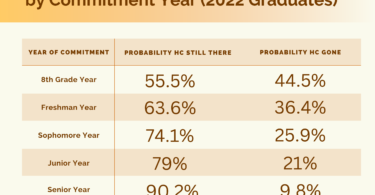Writing a quality introductory email to a college coach is one of the most important steps in the recruiting process for any high school player looking to play at the next level. College coaches’ email inboxes are flooded with interest from recruits each day, so if you want your email to have any chance of being read, you have to do everything right. This starts with contacting coaches at the appropriate time in your development and recruitment.
The goal of an introductory email is to captivate the interest of the coach or coaching staff so they want to follow up and evaluate you as a potential fit for their program. As such, contacting coaches before you have the skill set they are looking for will not get you very far. It’s also important to keep in mind that there are restrictions on when coaches at certain levels can email recruits back. At the D1 level, coaches cannot email recruits before September 1st of their junior year, even if it’s in response to interest initiated by the high school player. At the D2 level, it’s similar. That’s why including your coach’s contact information is very important. You can find communication restrictions for all levels of college baseball here.
A quality introductory email needs to come from YOU, the player. Don’t rely on your high school coach, summer coach, or parents to make contact with schools for you (although it can help to have your coach follow up with his own email after you have reached out). Set up your own recruiting email (first and last name with graduation year works great) and use it for all your recruiting communications. Reaching out to coaches yourself shows a level of maturity and commitment that coaches look for and value. In our last 3 years of college coaches surveys, we asked dozens of coaches across every level of college baseball how they like to be contacted by a recruit for the first time and every single one except 1 said a short email. Of those same coaches, every single one said they want the recruit to be the main communicator throughout the recruiting process.
The key to having your introductory email read is to make it easy for the coaches to get the information they need to evaluate you as a potential fit for their program. Send the email to the school’s head coach and CC the assistant coaches. Tell them what they want to hear and don’t waste their time with unnecessary information. Don’t talk about players or teams you have defeated in the past or current college players who you believe you could outperform. The coaches don’t need information about your training and workout programs. Think of your introductory email as an initial inquiry about a job you really want. Keep the email simple. Show them why you are qualified for the team, give them the information to measure your qualifications, and explain in one or two sentences why that particular program is a fit for you. This personalization is key. Generic emails without coach or school names and mass emails sent to a bunch of coaches at once go straight to the junk bin. Failure to personalize your email is a sign of laziness and shows a lack of serious interest. The same is true of emails with lots of grammatical and spelling errors. Take time to read your email over or have someone else do it for you. You are presenting yourself to the coach and you want to come across as sharp.
Most college coaches don’t care about seeing your stats listed out in an introductory email, so save the time and space. You absolutely will want to include a link to a skills video and any type of useful information (Rapsodo or Trackman data) that accompanies it. This may be the most important thing you include other than your name and contact information. Here’s why you need a skills video in today’s recruiting. Coaches prefer video links over attachments, and if your video requires a password to view, coaches won’t watch it. We discuss at length what to include in your pitching skills video or position player skill video, and you’ll want to make sure you put your most valuable skills at the very beginning of the video. If you are known for your bat, put hitting first in your video. If you have a power arm, show it off first. You’ll likely have 10-15 seconds to capture a coach’s interest and get him to watch more from the time he clicks play, so don’t waste any time. You’ll also want to include information about how and when coaches can see you. Understand that coaches have busy schedules during your high school season. Share information about any tournaments and showcases where you’ll be playing during the summer. This will give the coaches a better idea about how to get a look at you.
Finally, it’s okay to keep in contact with the coaches in order to keep your name in their minds. Email them every month or two, just to let them know how you’ve been doing. If a coach has been responsive, you may communicate with them more. All it takes is a quick note saying, “Hey coach, I’m throwing tomorrow at XYZ High School. I’ll let you know how it goes” or “Hey coach, I went 5-12 this week with 2 HRs, 8 RBIs, and threw a CG shutout.” Keep these emails short, simple, and informative.
Below is a list of everything you should include in your introductory email and a sample email. Take your time, read your email over more than once, and get it done right:
What to Include in an Intro Email:
- Subject line that will capture attention (standout skill or attribute) EX: Interested 2022 RHP Sitting 92 MPH
- Name
- Graduation year and position
- Personal contact information (cell #, they’ll have your email once you contact them)
- High School and high school coach’s contact information (email and cell #)
- Travel/club team and coach’s contact information (email and cell #)
- Academic information (GPA and SAT/ACT score)
- Link to skills video and relevant skill metrics (Velo, Pitching/Hitting readouts from Rapsodo, etc.)
- Specific reason why you are interested in the school (no more than 1 or 2 sentences)
- Whether or not you have filled out the school’s questionnaire online (make sure you fill it out in advance)
- Future games schedule
- Any other details they should know (If you have previously attended the school’s camp or met the coaches)
Sample Introductory Email:
To: Reed@email.edu, RecruitingCoordinator@email.edu, SecondAssistant@email.edu
Subject: Johnny Appleseed 2019 P/SS
Coach Reed,
My name is Johnny Appleseed. I am a junior at City High School. I am a pitcher and shortstop and am very interested in your program because it is a mid-sized D1 school and has the sports management major I am looking for. My coach at CHS is Paul Thompson. His email is paulthompson@email.com and his phone number is XXX-XXX-XXXX. I play for the City Bulldogs over the summer and my coach’s name is Steve Jones. His email is stevejones@email.com and his phone number is XXX-XXX-XXXX. Over the summer, I will be playing in the North Tournament July 22-30. I will also be coming to your camp on August 10. I have filled out your online questionnaire and included more information there, including my stats from last year and summer ball. My GPA is 3.02 and my SAT score was 1820. I have attached a copy of my academic transcript and my future game schedule. Here is the link to my short skills video, which includes Rapsodo data from my last bullpen. Thank you very much for your time and consideration and I look forward to hearing from you.
Sincerely,
Johnny Appleseed
Phone: XXX-XXX-XXXX







